- Clone
- KT11 (See other available formats)
- Regulatory Status
- RUO
- Other Names
- T cell receptor Vβ 11 [vb11]
- Isotype
- Rat IgG2b, κ
- Ave. Rating
- Submit a Review
- Product Citations
- publications
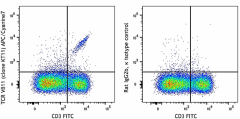
-

C57BL/6 splenocytes were stained with CD3 FITC and TCR Vß11 (clone KT11) APC/Cyanine7 (left) or Rat IgG2b, κ APC/Cyanine7 isotype control (right).
| Cat # | Size | Price | Quantity Check Availability | Save | ||
|---|---|---|---|---|---|---|
| 125917 | 25 µg | 118€ | ||||
| 125918 | 100 µg | 278€ | ||||
The Vβ11 gene locus is deleted in mice of TCR a haplotype (C57BR, C57L, SJL, SWR) and TCR c haplotype (RIII).Mice of TCR b haplotype (C57BL, BALB/c, AKR, etc) have Vβ11-bearing T cells .However, mice expressing MHC class II I-E and some superantigens, such as Mtv-8, Mtv-9 and Mtv-11 will show a partial deletion of Tb11-bearing T cells.
Product DetailsProduct Details
- Verified Reactivity
- Mouse
- Antibody Type
- Monoclonal
- Host Species
- Rat
- Formulation
- Phosphate-buffered solution, pH 7.2, containing 0.09% sodium azide.
- Preparation
- The antibody was purified by affinity chromatography and conjugated with APC/Cyanine7 under optimal conditions.
- Concentration
- 0.2 mg/ml
- Storage & Handling
- The antibody solution should be stored undiluted between 2°C and 8°C, and protected from prolonged exposure to light. Do not freeze.
- Application
-
FC - Quality tested
- Recommended Usage
-
Each lot of this antibody is quality control tested by immunofluorescent staining with flow cytometric analysis. For flow cytometric staining, the suggested use of this reagent is = 0.25 µg per million cells in 100 µl volume. It is recommended that the reagent be titrated for optimal performance for each application.
- Excitation Laser
-
Red Laser (633 nm)
- Application References
-
- Quigley MF, et al. 2010. Proc Natl Acad Sci USA. 9:19414. PubMed
- RRID
-
AB_2800612 (BioLegend Cat. No. 125917)
AB_2800612 (BioLegend Cat. No. 125918)
Antigen Details
- Distribution
-
Positive on a subset of alpha/beta T cells
- Ligand/Receptor
- MHC/peptide
- Cell Type
- T cells
- Biology Area
- Immunology
- Molecular Family
- CD Molecules, TCRs
- Gene ID
- 21577 View all products for this Gene ID
- UniProt
- View information about TCR Vbeta11 on UniProt.org
Related Pages & Pathways
Pages
Related FAQs
Other Formats
View All TCR Vβ11 Reagents Request Custom Conjugation| Description | Clone | Applications |
|---|---|---|
| FITC anti-mouse TCR Vβ11 | KT11 | FC |
| PE anti-mouse TCR Vβ11 | KT11 | FC |
| Alexa Fluor® 647 anti-mouse TCR Vβ11 | KT11 | FC |
| PerCP/Cyanine5.5 anti-mouse TCR Vβ11 | KT11 | FC |
| PE/Cyanine7 anti-mouse TCR Vβ11 | KT11 | FC |
| APC anti-mouse TCR Vβ11 | KT11 | FC |
| APC/Cyanine7 anti-mouse TCR Vβ11 | KT11 | FC |
Compare Data Across All Formats
This data display is provided for general comparisons between formats.
Your actual data may vary due to variations in samples, target cells, instruments and their settings, staining conditions, and other factors.
If you need assistance with selecting the best format contact our expert technical support team.
-
FITC anti-mouse TCR Vβ11
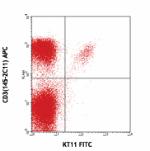
C57BL/6 splenocytes stained with CD3 (145-2C11) APC and KT11... -
PE anti-mouse TCR Vβ11
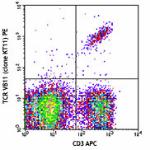
C57BL/6 splenocytes were stained with CD3 APC and TCR Vβ11 (... 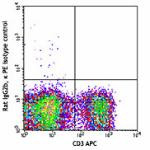
-
Alexa Fluor® 647 anti-mouse TCR Vβ11
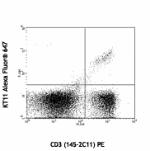
B57BL/6 splenocytes stained with CD3 (145-2C11) PE and KT11 ... -
PerCP/Cyanine5.5 anti-mouse TCR Vβ11

C57BL/6 splenocytes were stained with CD3 (clone 145-2C11) F... -
PE/Cyanine7 anti-mouse TCR Vβ11

C57BL/6 splenocytes were stained with CD3 (clone 145-2C11) F... -
APC anti-mouse TCR Vβ11

C57BL/6 splenocytes were stained with CD3 (clone 145-2C11) F... -
APC/Cyanine7 anti-mouse TCR Vβ11

C57BL/6 splenocytes were stained with CD3 FITC and TCR Vß11 ...

 Login / Register
Login / Register 












Follow Us